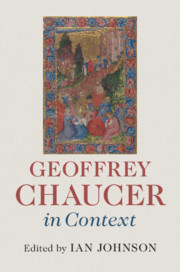Book contents
- Geoffrey Chaucer in Context
- Geoffrey Chaucer in Context
- Copyright page
- Contents
- Illustrations
- Contributors
- Abbreviations
- Introduction
- Part I Chaucer as Context
- Part II Books, Discourse and Traditions
- Part III Humans, the World and Beyond
- Part IV Culture, Learning and Disciplines
- Chapter 26 Childhood and Education
- Chapter 27 Philosophy
- Chapter 28 The Medieval Universe
- Chapter 29 Medicine and the Mortal Body
- Chapter 30 The Law
- Chapter 31 Art
- Chapter 32 Architecture
- Chapter 33 Heraldry, Heralds and Chaucer
- Part V Political and Social Contexts
- Part VI Chaucer Traditions
- Further Reading
- Index
Chapter 28 - The Medieval Universe
from Part IV - Culture, Learning and Disciplines
Published online by Cambridge University Press: 24 June 2019
- Geoffrey Chaucer in Context
- Geoffrey Chaucer in Context
- Copyright page
- Contents
- Illustrations
- Contributors
- Abbreviations
- Introduction
- Part I Chaucer as Context
- Part II Books, Discourse and Traditions
- Part III Humans, the World and Beyond
- Part IV Culture, Learning and Disciplines
- Chapter 26 Childhood and Education
- Chapter 27 Philosophy
- Chapter 28 The Medieval Universe
- Chapter 29 Medicine and the Mortal Body
- Chapter 30 The Law
- Chapter 31 Art
- Chapter 32 Architecture
- Chapter 33 Heraldry, Heralds and Chaucer
- Part V Political and Social Contexts
- Part VI Chaucer Traditions
- Further Reading
- Index
Summary
Chaucer’s universe was an interconnected system, in which all things had their divinely ordered place. This chapter explores the sources and status of natural knowledge in the later Middle Ages, and Chaucer’s employment of that knowledge for poetic and didactic purposes. It explains how medieval philosophers used their inheritance of classical and Islamic knowledge, refining an understanding of a harmonious cosmos through the sciences of astronomy, cosmology, music and medicine. These were not just theoretical sciences, but practical arts. Chaucer understood, and explained, the astrological workings of tables and instruments and their predictive power for meteorology and medicine. He never let technicalities overwhelm poetry, but it is clear that the sciences were of great interest to Chaucer. They were worthy of serious study both for their practical potential and their philosophical or ethical implications, and a field in which, through his Treatise on the Astrolabe, Chaucer made his own unique contribution.
Information
- Type
- Chapter
- Information
- Geoffrey Chaucer in Context , pp. 239 - 251Publisher: Cambridge University PressPrint publication year: 2019
